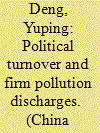| Srl | Item |
| 1 |
ID:
170419


|
|
|
|
|
| Summary/Abstract |
Some view recent, high-profile Chinese aid and investment agreements that have followed changes in the leadership of recipient states as evidence of China’s intent to compete for political influence in countries that are traditionally close to the United States and its allies. We examine how patterns of China’s development investment vary with changes of domestic leadership in potential recipient states, and argue that domestic coalition turnover may plausibly create uncertainty as to whether recipient countries will shift political allegiance towards or away from Chinese influence. If China indeed views development finance as a tool to acquire or maintain influence in developing countries, the timing of coalition changes in such countries should coincide with increases in China’s development commitments. We use AidData’s Global Chinese Official Finance Dataset and an extended version of the Change in Source of Leader Support (CHISOLS) Dataset of domestic coalition changes to evaluate the relationship between Chinese finance and leader turnover in non-OECD countries throughout the period 2000–2014. Our analysis provides some statistical evidence that political turnover influences the allocation of more concessional, ODA-like finance from China. We also find evidence that the relationship between domestic coalition changes and Chinese financial flows varies according to the recipient’s alliance status with the United States and regime type.
|
|
|
|
|
|
|
|
|
|
|
|
|
|
|
|
| 2 |
ID:
170349


|
|
|
|
|
| Summary/Abstract |
This paper aims to examine the relationship between political turnover and pollution discharges by listed firms in China. The empirical results show that political turnover is associated with more firm pollution discharges, particularly if the newly appointed officials are promoted locally or normally transferred. Furthermore, higher frequency of political turnover is linked with more pollution discharges. Lastly, our extended analysis illustrates that political connection is positively associated with firm pollution discharges and plays a moderating role in the relationship between political turnover and environmental performance.
|
|
|
|
|
|
|
|
|
|
|
|
|
|
|
|
| 3 |
ID:
162219


|
|
|
|
|
| Summary/Abstract |
Can technological change contribute to political turnover? Influential theories suggest that technological change represents a form of creative destruction that can weaken incumbents and strengthen outsiders, leading to political turnover. This paper investigates a large-scale historical natural experiment: the impact of the green revolution on single-party dominance in India. Drawing on a theoretical framework based on models of contests, this paper argues that high-yielding variety (HYV) crops strengthened the incentives and capacity of a politically excluded group, in this case agricultural producers, to seek greater political representation. Exploiting the timing of the introduction of HYV crops, together with district-level variation in suitability for the new crop technology, instrumental variables analyses show that the green revolution played a pivotal role in the rise of agrarian opposition parties and decline of single-party dominance. The findings support theories linking technological change to political turnover, with important implications for the political economy of democratization.
|
|
|
|
|
|
|
|
|
|
|
|
|
|
|
|